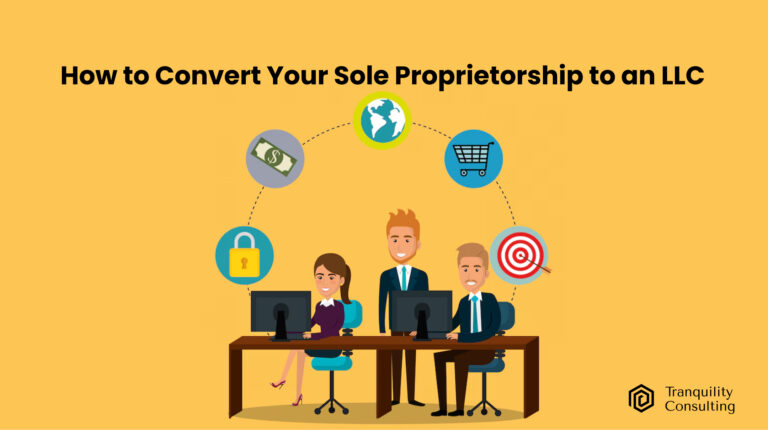Running a sole proprietorship is a standard start for many small business owners, but transitioning to a Limited Liability Company (LLC) can offer many advantages as the business grows. Shifting to an LLC structure can provide personal liability protection, tax benefits, and a more professional image. In this guide, we’ll walk you through how to Convert Your Sole Proprietorship to an LLC, discuss its advantages, and answer some frequently asked questions.
Why Convert from a Sole Proprietorship to an LLC?
Before we dive into the steps, let’s quickly look at why you might consider converting your sole proprietorship into an LLC:
- Limited Liability Protection: Unlike a sole proprietorship, an LLC limits your liability. Your assets, like your home or car, are generally protected from business debts or legal issues.
- Tax Flexibility: An LLC offers more options for how you are taxed, potentially allowing you to save on self-employment taxes by choosing to be taxed as an S Corporation.
- Credibility: Forming an LLC can make your business appear more credible and professional to clients, suppliers, and lenders.
How to Convert Your Sole Proprietorship to an LLC
If you ask, “Can I convert my Sole Proprietorship to an LLC?” the answer is a resounding yes! Here’s a breakdown of the steps involved.
Choose Your State and Verify Name Availability
The first step in How to Convert Your Sole Proprietorship to an LLC is deciding in which state you’ll form your LLC. Most business owners choose to create an LLC in their home state, but some choose states with favorable tax laws, like Delaware or Nevada.
- Check Name Availability: Your LLC’s name must be unique in your state. Most states have an online database where you can search for name availability.
- Include LLC Designation: The name must end with “LLC,” “Limited Liability Company,” or a similar designation required by your state.
File Articles of Organization
The next major step in How to Convert Your Sole Proprietorship to an LLC is filing the Articles of Organization (sometimes called a Certificate of Formation). This official document typically includes the following:
- LLC’s Name and Address: Include your LLC’s legal and primary address.
- Registered Agent: A registered agent is responsible for receiving legal and government notices on behalf of the LLC.
- LLC’s Purpose: Some states may require you to list the purpose of your LLC.
Once completed, submit the document along with the necessary filing fees. Fees vary from state to state but typically range from $40 to $3000.
Create an Operating Agreement
An Operating Agreement is only sometimes required by law but is highly recommended. It outlines the ownership, management structure, and operating procedures of the LLC,
- Each member’s responsibilities and rights
- Profit and loss distribution
- Voting powers and decision-making processes
- Procedures for adding or removing members
Obtain an Employer Identification Number (EIN)
You must apply for a new one if your sole proprietorship already has an EIN. An EIN, issued by the IRS, is necessary for tax filing and setting up a business bank account. Applying for an EIN is free and can be done online on the IRS website.
Apply for Required Business Licenses and Permits
As an LLC, your business may require specific licenses or permits depending on the industry and location. Check with local, state, and federal agencies to ensure compliance. Requirements may include general business licenses, professional licenses, and zoning permits.
Open a Business Bank Account
A separate bank account is crucial for tracking income and expenses exclusively for your LLC. This is an excellent way to reinforce the separation between personal and business finances, essential for maintaining the limited liability protection an LLC offers.
Update Contracts, Agreements, and Marketing Materials
If your business already has contracts with vendors, clients, or other third parties, you must update them to reflect your new LLC status. Additionally, consider updating marketing materials to reflect the name change, including your website, business cards, and social media profiles.
Inform the IRS and Other Relevant Agencies
Your business structure change should be notified to the IRS and other relevant government agencies. Update your tax filing status, as LLCs have different tax obligations and may provide various tax benefits.
Tax Implications When Converting a Sole Proprietorship to an LLC
One of the primary advantages of How to Convert Your Sole Proprietorship to an LLC is its flexibility in taxation. Here are a few options:
- Default Taxation: A single-member LLC is considered a disregarded entity by default and taxed like a sole proprietorship.
- Electing S-Corporation Status: An LLC can elect to be taxed as a S Corporation, which might help save on self-employment taxes.
- Pass-Through Taxation: Like a sole proprietorship, LLC income typically “passes through” to the owner’s tax return, avoiding double taxation.
Common Mistakes to Avoid
While converting a sole proprietorship to an LLC is a straightforward process, avoid these common mistakes:
- Ignoring State-Specific Requirements: Every state has unique requirements, so review the requirements in your state thoroughly.
- Skipping the Operating Agreement: Even if it’s not legally required, an Operating Agreement helps establish clarity in your business operations.
- Mixing Personal and Business Finances: Failing to separate business and personal finances could jeopardize liability protection.
Conclusion
Converting your business from a Sole Proprietorship to an LLC is a significant step that can provide long-term benefits, from protecting personal assets to offering greater tax flexibility. By following these steps on How to Convert Your Sole Proprietorship to an LLC, you’ll be well-prepared for the transition and better positioned for future growth.
FAQ
1. Can I convert my Sole Proprietorship to an LLC if I am the only owner?
Yes, you can. A single-member LLC is very common and provides many of the same protections and tax benefits as a multi-member LLC. As the sole owner, you’ll retain complete control over your business.
2. Do I need a lawyer to convert my sole proprietorship to an LLC?
While hiring a lawyer can simplify the process, it’s not required. Many business owners successfully convert their Sole Proprietorship to an LLC by following their state’s guidelines. However, if your business structure or industry is complex, consulting with a professional can be helpful.
3. Will I need a new EIN for my LLC?
When converting from a sole proprietorship to an LLC, you need a new Employer Identification Number (EIN). The IRS considers an LLC a separate entity.
4. Can Tranquility Consulting help with tax planning throughout the year?
Yes, our team provides year-round tax planning to help minimize your tax burden, strategize for deductions, and prepare for quarterly and annual filings.
5. Are there ongoing compliance requirements for an LLC?
Yes, unlike a sole proprietorship, LLCs have specific compliance requirements. These often include filing an annual report, paying annual fees, and renewing required licenses and permits. Requirements vary by state, so check your state’s guidelines.
If you have any questions or need business-related tax consulting advice, please contact us at: [email protected]





